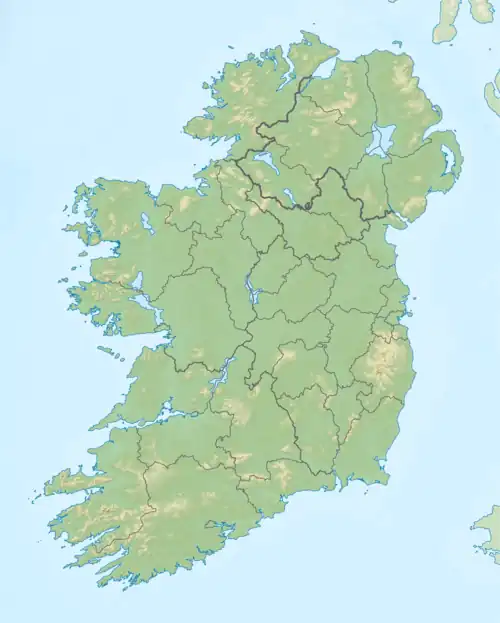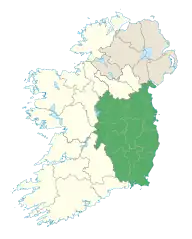| Gravale | |
|---|---|
| Droibhéal | |
 Gravale (highest) with Carrigvore (right) from SE | |
| Highest point | |
| Elevation | 718 m (2,356 ft)[1] |
| Prominence | 123 m (404 ft)[1] |
| Listing | 100 Highest Irish Mountains, Hewitt, Arderin, Simm, Vandeleur-Lynam |
| Coordinates | 53°07′N 6°21′W / 53.117°N 6.350°W |
| Naming | |
| English translation | difficult passage |
| Language of name | Irish |
| Geography | |
 Gravale Location in Ireland | |
| Location | Wicklow, Republic of Ireland |
| Parent range | Wicklow Mountains |
| OSI/OSNI grid | O1049009420 |
| Topo map | OSi Discovery 56 |
| Geology | |
| Mountain type | Granite with microcline phenocrysts[1] |
| Climbing | |
| Easiest route | from the Sally Gap, or along the R115 |
Gravale (Irish: Droibhéal, meaning 'difficult passage')[2] at 718 metres (2,356 ft), is the 79th–highest peak in Ireland on the Arderin scale,[3] and the 98th–highest peak on the Vandeleur-Lynam scale.[4][5] Gravale is in the middle sector of the Wicklow Mountains range, in Wicklow, Ireland.[6] Gravale sits on a north-east to south-west "boggy ridge" that forms the "central spine" of the whole range, which runs from the Sally Gap, to Carrigvore 682 metres (2,238 ft), to Gravale, and after a col to Duff Hill 720 metres (2,360 ft), which is part of the larger massif of Mullaghcleevaun 849 metres (2,785 ft).[6][7]
Gravale's prominence of 123 metres (404 ft), does not quality it as a Marilyn, but does rank it the 45th-highest mountain in Ireland on the MountainViews Online Database, 100 Highest Irish Mountains, where the minimum prominence threshold for inclusion on the list is 100 metres.[8][5]
Naming
According to Irish academic Paul Tempan, the historian Eoin MacNeill, writing in the Journal of the Royal Society of Antiquaries of Ireland (JRSAI), thought that the Irish name "Drobeóil", as listed in the Metrical Dinsenchas, had survived the mountain name "Gravale".[2] Tempan also notes that historical maps of the estates in which Gravale lies suggest that the col between Gravale and Duff Hill was known as "Lavarna" or "Lavarnia", from the Irish "Leath-Bhearna", meaning "half-gap", and that this was likely a difficult trail from the Blessington lakes area to Lough Dan.[2]
Bibliography
- Fairbairn, Helen (2014). Ireland's Best Walks: A Walking Guide. Collins Press. ISBN 978-1848892118.
- Fairbairn, Helen (2014). Dublin & Wicklow: A Walking Guide. Collins Press. ISBN 978-1848892019.
- MountainViews Online Database (Simon Stewart) (2013). A Guide to Ireland's Mountain Summits: The Vandeleur-Lynams & the Arderins. Collins Books. ISBN 978-1-84889-164-7.
- Dillion, Paddy (1993). The Mountains of Ireland: A Guide to Walking the Summits. Cicerone. ISBN 978-1852841102.
See also
References
- 1 2 3 "Gravale". MountainViews Online Database. Retrieved 15 July 2019.
- 1 2 3 Paul Tempan (February 2012). "Irish Hill and Mountain Names" (PDF). MountainViews.ie.
- ↑ Simon Stewart (October 2018). "Arderins: Irish mountains of 500+m with a prominence of 30m". MountainViews Online Database.
- ↑ Simon Stewart (October 2018). "Vandeleur-Lynams: Irish mountains of 600+m with a prominence of 15m". MountainViews Online Database.
- 1 2 Mountainviews, (September 2013), "A Guide to Ireland's Mountain Summits: The Vandeleur-Lynams & the Arderins", Collins Books, Cork, ISBN 978-1-84889-164-7
- 1 2 Fairbairn, Helen (2014). Dublin & Wicklow: A Walking Guide. Collins Press. ISBN 978-1848892019.
- ↑ Dillion, Paddy (1993). The Mountains of Ireland: A Guide to Walking the Summits. Cicerone. ISBN 978-1852841102.
Walk 4: Carrigvore, Gravale, Duff Hill, Mullaghcleevaun East Top, Mullaghcleevaun
- ↑ "Irish Highest 100: The highest 100 Irish mountains with a prominence of +100m". MountainViews Online Database. September 2018.
External links
- MountainViews: The Irish Mountain Website, Gravale
- MountainViews: Irish Online Mountain Database
- The Database of British and Irish Hills , the largest database of British Isles mountains ("DoBIH")
- Hill Bagging UK & Ireland, the searchable interface for the DoBIH


.jpg.webp)
